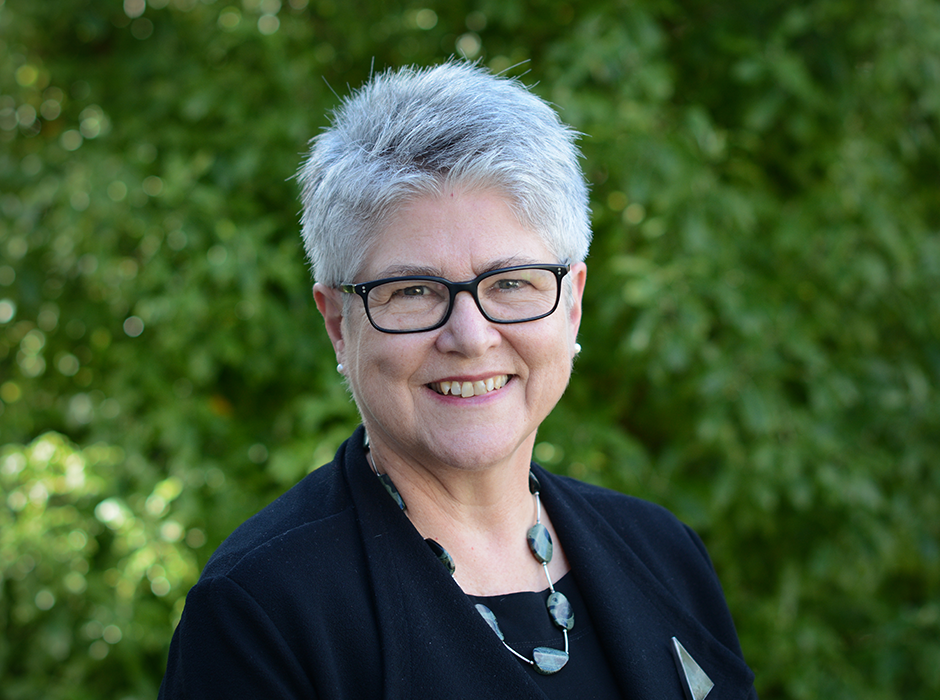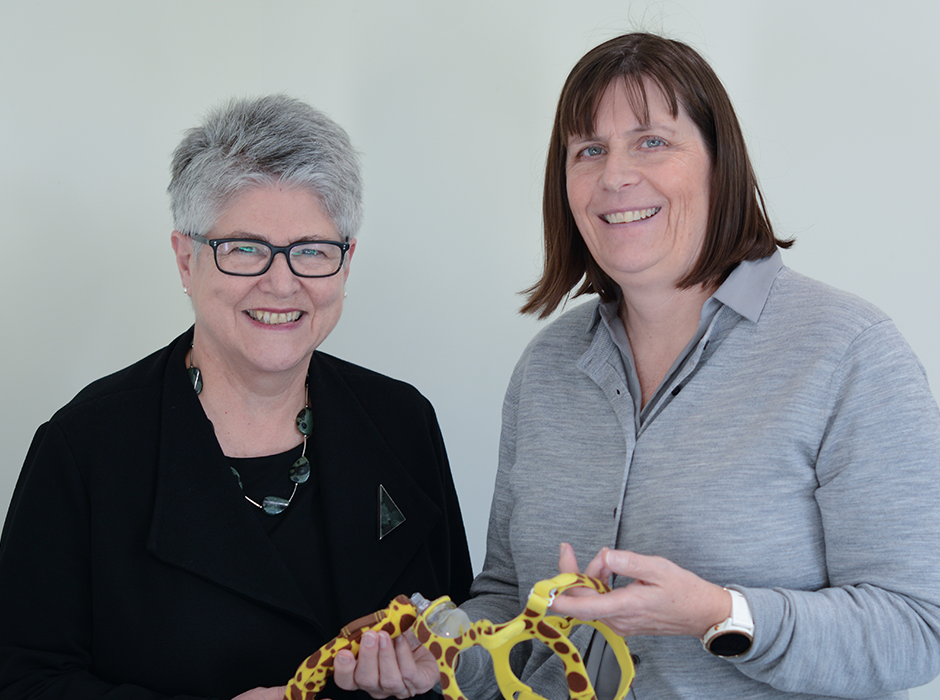
Emeritus Professor Dawn Elder retires after a long, rewarding career in paediatrics, using her expertise to make a difference in the lives of countless children.
Actors are warned against working with children because of their unpredictability, but for retiring University of Otago Emeritus Professor Dawn Elder that was one of the main attractions of specialising in paediatrics.
Professor Elder stepped down from her roles as Deputy Dean and Head of the Department of Paediatrics and Child Health on the Wellington campus at the end of May last year but continued with locum work for Te Whatu Ora’s regional paediatric sleep medicine service until the end of July.
She completed her MB ChB at Otago Medical School in 1980, and went on to do a Diploma in Child Health, thinking it would be a good stepping stone into training as a general practitioner.
But her entertaining young patients ensured she never did move on to become a GP.
“It was a bit more fun in some ways. You couldn’t not be relaxed with your patients, there’s much more interaction than with adults.”
She recalls one young patient who was too upset to be examined.
“We waited for the professor to come around because we thought that would work, and she kicked him in the stomach and said ‘go away, Mister’, and I thought, ‘hmm, this is the career for me. I can work with this.’”
After further training in New Zealand and overseas, Professor Elder returned to a joint clinical-academic role as a neonatal paediatrician at the Wellington Hospital Neonatal Intensive Care Unit (NICU) from 1995 to 2004, providing care for babies born prematurely and others needing specialist treatment.
Her early research as a paediatric trainee was related to Sudden Infant Death Syndrome, and her interest in infant breathing carried over into her later studies on sleep and breathing in children, which she worked on with Otago research colleague Associate Professor Angela Campbell at the WellSleep Centre at Wellington’s Bowen Hospital.
At an early stage in her career, Professor Elder was encouraged to do sexual abuse medical and forensic examination training, a role which was regarded as a ‘woman doctor’s work’ at that time.
It led to a career-long involvement in the child protection field, examining children referred by the Police and by the child protection agency Oranga Tamariki.
She has been called as an expert witness in high profile trials, including for the defence in the Supreme Court appeal which resulted in the quashing of Peter Ellis’s conviction of sexual offending against children at the Christchurch Civic Childcare Centre.
While difficult, the child protection work offered a different sort of challenge, she says.
“I was doing neonatology at the same time, and in some ways, that was more challenging because you had these vulnerable little people on ventilators, whereas the children who had had bad things happen to them, you couldn’t make it much worse, you could only, hopefully, make it better. I was able to offer a good assessment and support, and some pathways and some advocacy, and provide an expert medical opinion. I think it has been a really rewarding part of my life.”
She also enjoyed her work with police officers on Child Protection Investigation courses, visiting the Police College in Porirua several times a year to give talks.
“I really liked the variety. It was really interesting to learn about police investigation methods and how they operate.”
In 2004, Professor Elder admitted to herself that she was burnt out from juggling the half-time academic role and what appeared to be a full-time clinical role and stepped away from her work with neonates.
In a book about the lives of female doctors, ‘In practice’ edited by fellow Otago Medical School graduate Dr Rosy Fenwicke, she describes being on duty as the weekend on-call senior neonatal intensive care doctor from 8am on Fridays to 8am on Mondays.
“One moment you might be sitting at home watching television and 15 to 20 minutes later you are in the hospital telling a distraught parent that despite all efforts you cannot resuscitate their baby.
“The phone rang, you ran to the car, you drove through the traffic lights, you ran up the back stairs to the intensive care unit, you called on all those years of training, and (then) despite all that experience you still (couldn’t) save that baby’s life.”
The pressures on staff holding down joint academic and clinical roles are not always fully recognised by the University, she feels.
“It’s a busy life and the medical school does need the joint clinical academics because they are the people who are at the heart of teaching the next generation of doctors. We do need to take care of the people who work hard trying to do those two jobs.”

Professor Elder with Otago research colleague Associate Professor Angela Campbell at the WellSleep Centre at Wellington’s Bowen Hospital.
Professor Elder went on to forge a different path for herself, qualifying as a paediatric sleep medicine specialist in 2008, and completing her PhD on respiratory variability in infants and children in 2010. She developed the paediatric sleep service for children at Wellington Hospital, identifying those with obstructive sleep apnoea who could benefit from respiratory support through the use of continuous positive airway pressure (CPAP) machines.
Professor Elder’s work has been recognised with a Distinguished Service Award from the Sleep Apnoea Association of New Zealand and the New Zealand branch of the Australasian Sleep Association. She has been honoured with the invitation to give the Montgomery Spencer Memorial Lecture at the Paediatric Society of New Zealand Annual Scientific Meeting in November this year.
Her work as Head of Department and Deputy Dean was acknowledged with the Senior Leadership Award at the 2021 Wellington campus’ staff awards.
She feels fortunate to have had such an interesting career.
“It is rewarding to see children grow up and get better, to be able to make a difference in little persons’ lives. And I’ve had the opportunity to meet a fantastic range of colleagues, many of whom will be life-long friends.”
She has seen huge changes in neonatal care since starting out in paediatrics as a trainee in 1984.
“There were babies that didn’t survive because they were very pre-term when I started, and now they survive quite well. And CPAP has been invented in my practising lifetime, and we are now able to use it to help children.”
As a counterpoint to her busy career, when she turned 50 she decided to return to her love of music, taking singing lessons and later releasing two jazz albums, ‘As Prescribed’ and ‘Alternative Medicine’, both of which are available on platforms including Spotify and Apple Music.
She says, “I couldn’t really go out and sing in smoky nightclubs as a secondary job, so I decided on the albums as a goal in that area.”
Though she has been based in Wellington for most of her career, Professor Elder has visited the main campus in Dunedin often, sitting on promotions assessing committees and connecting with colleagues in other departments.
She has recently taken on the role as chair for the committee organising celebrations for the Otago Medical School’s 150th anniversary in 2025.
She is looking forward to the opportunity to highlight the achievements of Otago’s medical school graduates.
“There have been a lot of illustrious people who have gone through the medical school and there have been lots of firsts, so it is about highlighting those.”
For students considering a career in medicine Professor Elder says they need to understand it is a vocation, not a nine to five job.
“Think carefully about what branch of medicine you want to go into and make sure it suits your goals for your lifestyle and your personality. Don’t pick paediatrics if you don’t like children, and having a bit of a laugh, and the day not going how you would expect. If you don’t want to be kicked in the stomach and told to go away, don’t do paediatrics,” she laughs.
Kōrero by Cheryl Norrie, Communications Adviser, University of Otago, Wellington.